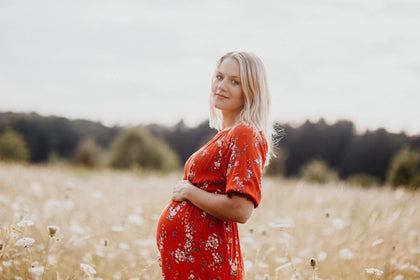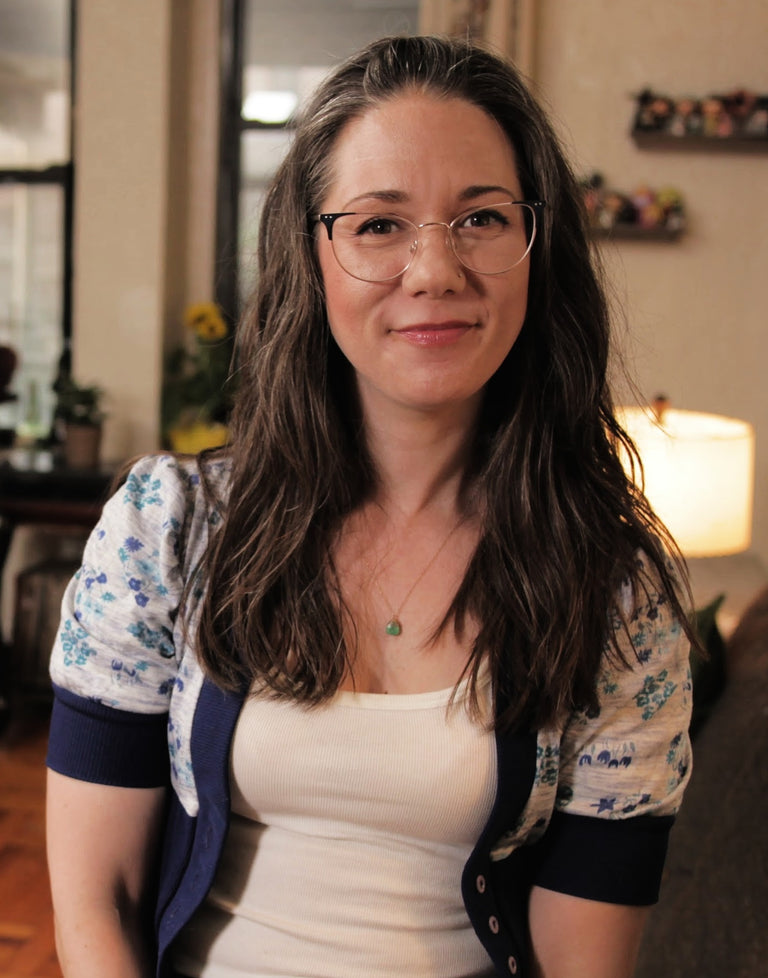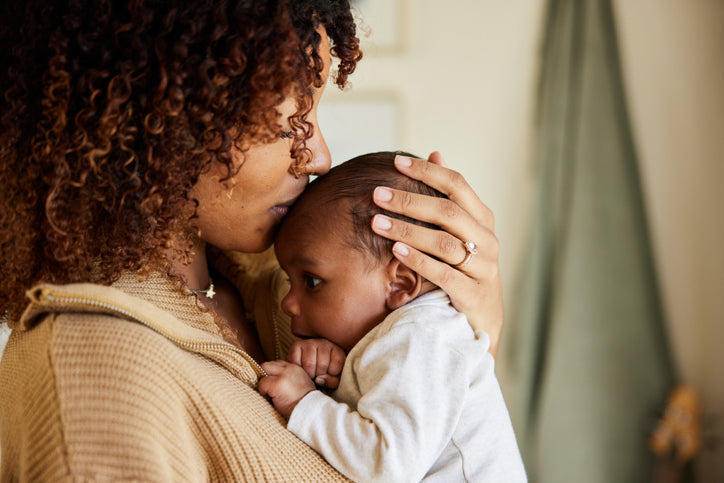Pregnancy, childbirth and breastfeeding — these three things alone bring about tremendous changes in the body, both physiologically and hormonally. And yes, this impact can be felt from the womb all the way to your hair follicles. Read on to learn more about postpartum hair loss, what causes it, and what products to use to get back the thick, healthy hair you had during pregnancy.
#include-related-slider#
What Causes Postpartum Hair Loss?
@vegamour Did you know that about 40% to 50% of women will experience postpartum hair loss after pregnancy? Here are @indyrod’s 3 tips to help reduce postpartum shedding: 𝟏. 𝐓𝐫𝐲 𝐭𝐨 𝐌𝐚𝐧𝐚𝐠𝐞 𝐒𝐭𝐫𝐞𝐬𝐬 𝐀𝐬 𝐁𝐞𝐬𝐭 𝐀𝐬 𝐘𝐨𝐮 𝐂𝐚𝐧 After giving birth, the body is under a lot of physiological stress, not just from hormonal changes but also as it heals from childbirth. Stress can be a major part of hair loss, so be sure to practice stress-relieving tactics. 𝟐. 𝐔𝐬𝐞 𝐚 𝐍𝐨𝐮𝐫𝐢𝐬𝐡𝐢𝐧𝐠 𝐇𝐚𝐢𝐫 𝐒𝐞𝐫𝐮𝐦 GRO Hair Serum is plant-based and free from known toxins. This lightweight, non-greasy formula is clinically proven to increase the appearance of hair density while reducing the signs of shedding. 𝟑. 𝐀𝐝𝐣𝐮𝐬𝐭 𝐘𝐨𝐮𝐫 𝐇𝐚𝐢𝐫 𝐑𝐨𝐮𝐭𝐢𝐧𝐞 Avoid excessive heat, chemical treatments, styling, brushing and anything else that could potentially stress out recovering follicles. Embrace your natural locks for a few months following childbirth to allow your hair the opportunity to grow back healthy. #vegamour #postpartumhairloss #femalehairloss #postpartumjourney #hairlosssolution ♬ smiles & sunsets - ultmt.
It might be reassuring to know that postpartum hair loss is exceedingly common, with most women experiencing some form of excessive shedding after childbirth. It’s probably more reassuring, however, to know that more often than not this form of hair shedding is not permanent and with a little extra TLC new moms can look forward to returning to healthy hair growth.
“Many new moms see noticeable hair loss a few months after having a baby. This is normal — and not true hair loss. Dermatologists refer to this condition as excessive hair shedding. The excessive shedding is caused by falling hormone levels,” explained Dr. Ailynne Marie Vergara-Wijangco, a board-certified Clinical Dermatologist and researcher with Thank Your Skin.
This adds a new layer of meaning to the commonly thrown around idea of “pregnancy hormones,” right? The truth is, a whole lot is going on in the hormone department during pregnancy and these hormonal changes often have a direct impact on your hair’s growth cycles.
Hair has a life cycle of four stages, which include anagen (the growth stage), catagen (a transition stage into rest), telogen (the resting stage), and exogen (the final shedding stage). Normally, each hair on the head is at a different stage of this cycle, so we’re always shedding and growing new hairs.
Pregnancy can temporarily derail these cycles, where a drastic uptick in hormones like estrogen and progesterone will cause follicles to stay in the active anagen phase of growth throughout gestation. While this can make your hair appear thicker and fuller during pregnancy, the other hormonal shoe drops after giving birth.
“During pregnancy, most women find that their hair gets thicker. However, many women experience hair loss after their pregnancy is over. This is because pregnancy causes your hormone levels to change drastically,” added Dr. Chun Tang of Pall Mall Medical in the United Kingdom.
Drastic is not an understatement! Hormones changes after childbirth are big, big changes in the body. This induces postpartum hair loss from two different angles.
First, the once high levels of estrogen and progesterone take a big dip after having the baby, which signals those hair-hogging follicles stuck in the anagen phase that they can get back to business as usual.
Second, drastic changes in the body of any kind can trigger a type of diffuse (all-over) hair loss called telogen effluvium (or TE), and this is technically what is happening during the postpartum period. Telogen effluvium is regarded as a form of stress-related hair loss since it’s typically triggered by some major stressor (whether internal or external), and childbirth definitely fits the bill.
These two factors together equate to what might seem like a scary amount of hair shedding but is in fact your body getting back to normal after the hormonal roller coaster that is pregnancy and childbirth.
Also: What Is Anagen Effluvium? One Type of Hair Loss Explained
So All This Hair Loss Is Normal?
Yes! Telogen effluvium is often a scary experience since it can feel like literally all your hair is falling out at once. It’s a type of hair loss that hits hard and (relatively) fast, before your body gets back to baseline and the hair growth cycles you had been accustomed to restart.
With TE and postpartum hair loss, it’s the major impact of childbirth on the body that triggers hair loss and it can take up to several months after birth for the hair shedding to happen. When it does, any hair follicle that moved into the telogen phase after birth is likely to shed its hair, even though hair doesn’t typically fall out in the telogen phase. Since about 30% of the follicles on our head are in the telogen phase at any given time, this can mean a lot of hair loss in a hurry.
“Once your postpartum hair loss happens, it can be quite overwhelming. While it’s unlikely that you’ll lose more hair than you would have done during the previous nine months, the sudden occurrence of this hair loss can make it feel like all of your hair is falling out,” added Dr. Tang.
The takeaway? Even though it might feel like it, all your hair is NOT falling out. Phew!
When Will My Hair Grow Back?
You might notice thinning hair within weeks of childbirth, though it’s not uncommon for postpartum hair loss to take about three months before becoming noticeable. It’s often most visible along the front part of the hairline, even though it affects the entire head.
Follow up question: how long will postpartum shedding last? “After delivery, hair follicles have to reset in their growth/shed cycle and a remarkable increase in shed can occur for 3-6 months,” explained Dr. Lisa Rhodes, a board-certified dermatologist with Westlake Dermatology. So you can expect a period of marked shedding, after which your hair growth will likely have already begun recovering.
An important thing to remember here is that hair growth takes time! Hair grows around six inches per year, which is about a half inch per month, so keep in mind that it will take several months for noticeable new growth to happen.
A few months of shedding plus a few months to start seeing new hair growth, we’re not talking about an insignificant amount of time here. “Most women see their hair return to its normal fullness by their child’s first birthday. Many women regain normal fullness even earlier,” shared Dr. Vergara-Wijangco.
Also: Can an IUD Cause Hair Loss?
How to Deal With Postpartum Hair Loss
Your hair should recover on its own, but there are a few things you can do to improve the health of your follicles and put your body in a better condition for hair growth.
Focus On Diet
Nutrition often becomes a major focus for women while pregnant, but it should continue to be a priority after childbirth, too. “In postpartum I often see moms become so wrapped up in the demands of early motherhood that nutrition unintentionally gets dropped to the wayside,” shared Lizzie Bolliger, doula and childbirth educator.
A healthy, varied and balanced diet that focuses on fruits, vegetables, healthy proteins, nuts, beans and other legumes is always important but becomes especially important postpartum since pregnancy can leave our bodies depleted and possibly even nutrient deficient. If you’re breastfeeding this means an extra and not insignificant nutritional demand on the body, too. Dark leafy greens, sweet potatoes and carrots are all beneficial for hair health, according to Dr. Tang.
Shop: GRO Dry Shampoo 3-Pack
Supplement Where Needed
“A sufficient prenatal vitamin is still needed in postpartum, breastfeeding or not, even for the most health conscious moms. Being nutrient deficient can cause a whole slew of postpartum issues like shedding hair, postpartum depression, exhaustion, and just not feeling like your best new mom self,” advised Ms. Bollinger.
Aside from prenatal vitamins, additional supplements specifically designed to help support healthy hair growth, like our GRO Biotin Gummies could be especially useful if you’re experiencing hair loss as a new mother. Of course, talk to your doctor about any supplements you're considering.
Manage Stress As Best As You Can
Being a new parent is hard. Period. Managing the stress that comes along with parenthood becomes doubly important since stress can induce or prolong hair loss.
Be sure to have a whole box of stress management tools at the ready, which could include things like exercise, meditation, getting as much sleep as you can, and even just getting some fresh air.
Also: 9 Ways to Lower Cortisol Naturally
Tweak Your Hair Game
There are several ways you can support healthy regrowth by adjusting your hair routine. Avoid excessive heat, chemical treatments, styling, brushing and anything else that could potentially stress out recovering follicles. “Embrace your natural locks for a few months following childbirth to allow your hair the opportunity to grow back healthy,” added Dr. Tang.

Dr. Vergara-Wijangco also recommends being choosy about hair products. “Use a volumizing shampoo. These shampoos tend to contain ingredients like protein that coat the hair, making the hair appear fuller,” she said. Guess what? Our GRO and GRO+ shampoos contain an exclusive and proprietary protein called Karmatin™ which will help hair look fuller while also supporting your follicle’s journey back to healthy growth.
And finally, try a new hairstyle! Sometimes an expertly executed cut can make all the difference. “Some haircuts make hair look fuller. An experienced stylist can tell you what will work for you,” said Dr. Vergara-Wijangco. Dry shampoo can also be a volume game-changer.

When Should I See A Doctor?
More good news about postpartum hair loss: it usually resolved on its own without any needed medical intervention. With that said, extreme or prolonged postpartum hair loss can be a sign that perhaps there are other issues at play and should be reason to seek out a healthcare provider.
“If your hair does not regain its normal fullness after one year, you may want to see a dermatologist. Something else may be causing your hair to fall out. People lose hair for many reasons, and an accurate diagnosis is essential for effective treatment,” advised Dr. Vergara-Wijangco.
If you're concerned that your postpartum hair loss isn't turning around, seek professional medical advice.
The Takeaway
Want support? Connect with our growing community of thousands of females who have come together to support each other through all our hair struggles and triumphs.
Postpartum hair loss can be stressful, but as long as you make sure to nourish your body and soul this period will pass quickly and you’ll be back to strong, healthy hair in no time!
More From VEGAMOUR
- How to Moisturize Your Scalp
- Do Collagen Supplements Work?
- What Is Hygral Fatigue?
- Shop VEGAMOUR Best Sellers




















